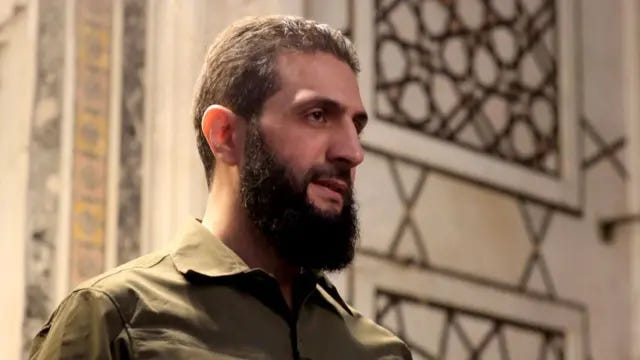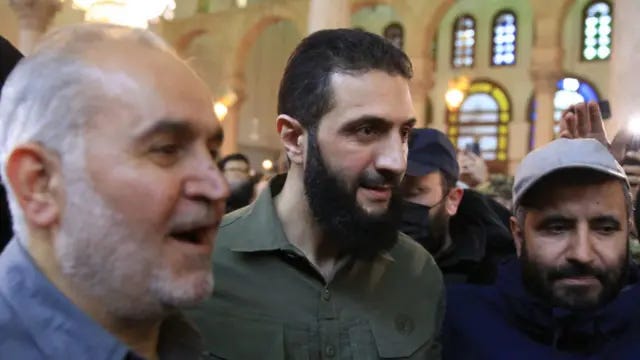Syria: Who is rebel leader Abu Mohammed al-Jawlani?
We're bringing you more now on Abu Mohammed al-Jawlani, the leader of Hayat Tahrir al-Sham (HTS), who made a speech at the Umayyad Mosque in Damascus earlier.
In 2013, the US named Jawlani as a specially designated global terrorist and offered a $10m reward for information that leads to his capture.
But the rebel leader has for years endeavoured to shift the perception of his organisation to one that could be accepted by Syrians as an alternative to the Assad regime.
His Islamist militant group has played a key role in bringing down the Assad regime. HTS was set up in 2012 under a different name, the al-Nusra Front, and pledged allegiance to al-Qaeda the following year.
In 2016, Al-Nusra broke ties with al-Qaeda, and it took the name Hayat Tahrir al-Sham when it merged with other factions a year later.
But the UN, US, UK and a number of other countries continued to consider HTS as an al-Qaeda affiliate and frequently refer to it as al-Nusra Front.
A scene few could have imagined: Jawlani in the Umayyad Mosque
Feras Kilani
BBC Arabic Special Correspondent, in Damascus
It was a moment no one could have imagined just 24 hours earlier. Without prior warning or arrangements, Abu Mohammad al-Jawlani, the leader of Hay’at Tahrir al-Sham (HTS), made a surprising visit to the Great Umayyad Mosque in Old Damascus.
Seeing him from just a few metres away felt surreal. This mosque had long been a symbolic site where Bashar al-Assad and his late father, Hafez al-Assad, would often perform Eid prayers—a symbolic act for the rulers of the capital.
Surrounded by hundreds of fighters and personal guards, Jawlani entered the mosque, performed the Maghrib prayer, and delivered a brief address to those gathered around him amid chants of victory and “Allahu Akbar".
Earlier, Jawlani had toured key areas of the city, including the iconic Umayyad Square, surrounded by Syria’s most significant government institutions, such as the General Staff Headquarters and state television. There, he prayed before continuing his tour. I was present in the square, but his guards kept everyone at a distance as he approached.
While many Syrians expressed joy at what they see as a turning point, their celebrations were tinged with apprehension about what lies ahead. The acrid smell of gunpowder still fills the air in Damascus, a city locked down and nearly deserted. As Jawlani’s tour unfolded, plumes of smoke rose into the sky, obscuring the future and raising questions about the days and weeks to come.
Dressed in his military attire, Jawlani projected the image of a ruler in Damascus, standing over a city—and a nation—that had been under the grip of Bashar al-Assad and the Baath regime for decades. In less than two weeks, that regime has crumbled, leaving little more than a memory.
Yet, with Jawlani's controversial jihadist past, the question remains: can he succeed in governing the capital and its surrounding territories?
The BBC




